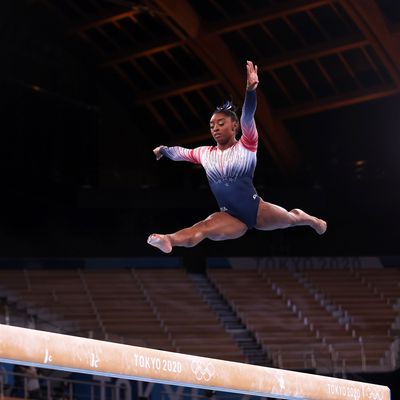
When I watched Simone Biles perform her balance-beam routine on Tuesday morning, in her first event since withdrawing from the team competition last week, I cheered as if she had just won the gold medal. Because as far as I was concerned, she had. What she did sure seemed amazing to me, even independent of the context of this Olympics for her. How is anyone supposed to be better than that?
But this is because I don’t know anything about gymnastics. And neither do you. Here’s some solid proof of our ignorance. This is Washington Post writer Emily Giambalvo, an actual gymnastics expert who has studied and observed and reported on routines and athletes, and knows the sport, as well as anyone, describing Biles’s warm-up:
She added in the next tweet, “same routine she’s done all year, just a different dismount.” That is a level of expertise that is required and deeply appreciated from a professional sportswriter who knows their stuff. It is also something that almost no one watching at home, least of all me, could possibly decipher. Which, I’d argue, is what makes the Olympics so purely enjoyable. Watching them is like discovering some new field of expertise you had no clue existed and just standing back in awe of how incredible everyone is at it. Cheering for Biles and her American teammates is easy, because I honestly cannot believe anyone is physically capable of doing what they so. We’d be more critical, I’m sure, if we had a more refined, nuanced understanding of the balance beam (or handball, or luge, or whatever sport we just looked at for the first time in four years), nitpicking every little movement here or there. But what would be the fun in that? There is joy in the awe. To see that it is done so well, let alone done at all, is to make your jaw drop.
Biles did end up winning the bronze medal in the beam, with Chinese gymnasts Guan Chenchen and Tang Xijing taking the gold and silver, respectively. Having watched them, I can confirm that what they did was also mind-boggling; sometimes viewing the Olympics is a little like being a parent who just thinks what all you kids are doing is great. This is a feature of the Olympics, not a bug. There is no reason not to be overwhelmingly proud of every single athlete involved. Americans do not usually watch sports this way — no one’s “proud” of Tom Brady other than his mom, and even she has to be getting a little sick of it — but I think we’d be better off if we did. It’s healthier and even a little truer to why we’re supposed to be into all this in the first place: To revel in human achievement, to witness accomplishments we’d never be able to dream of ourselves, to see the humanity in the extraordinary. After four years of hot takes about labor fights, deflated footballs, and bat flips, it is downright refreshing.
I mean, this is just joy right here:
That’s Athing Mu, who, one year ago, was finishing up high school in Trenton, New Jersey, through virtual classes and wondering, with the postponement of the Tokyo Olympics because of the pandemic, if she’d ever get a chance to compete in the Olympics. She already held several world records, but she trained by running through the abandoned streets of Trenton. Now she has a gold medal at the age of 19 — a year late.
I don’t know how watching that doesn’t make a person deliriously happy, even if you have no idea what it takes to be a champion. Even if you won’t watch track and field again until 2024.
Paradoxically, going in blind can make you feel like part of the story in a way that’s impossible in other sports. That phenomenon is perfectly encapsulated by Biles, whose performance was incredible, even independent of what she has gone through in the past week — but completely staggering in that context. With her bronze, she has now tied the all-time record for medals by a gymnast with eight, and it was impossible not to watch her and think, This is the medal she’s going to appreciate the most. She confirmed as much afterward, telling the Today show that “it means more than all of the golds because I’ve pushed through so much the last five years — and the last week while I’ve even been here.” She didn’t expect to medal on the beam, she said, but she wanted to compete, for herself, in an event that didn’t include twists, which had caused her such trouble in the team competition. And then she went out and won that record-tying medal. It is a happy ending to a story that has dominated this entire Olympics and burnishes Biles’s legend in a way that, all told, may end up being more important than if she had just dominated. Because the Olympics is about achievement and excellence — but more than anything, it is about awe. It’s all so incredible, and you can’t help but feel grateful to get to see it and feel like you’re part of it. And then do it again in four years.






























